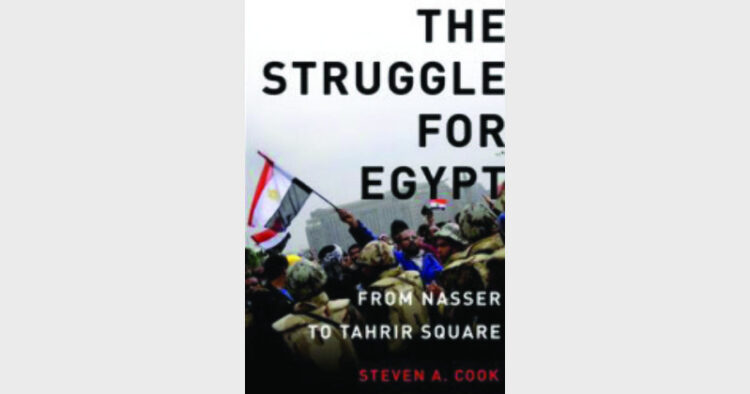Dr R Balashankar
The Struggle for Egypt – From Nasser to Tahrir Square, Steven A Cook, Oxford University Press, Pp 408(HB), $27.95.
Egypt has always held a strategic position in history because of its geography. For the West, it is the gateway to Asia and for Asia it is the buffer to the West. Despite being part of the Islamic world, it has been a strong ally of the US, though during the cold war it was closer to the Soviet camp. The 2011 movement saw a strong demand for democracy and President Hosni Mubarak had to quit after two decades of iron-hold on the politics of the country.
The Struggle for Egypt – From Nasser to Tahrir Square by Steven A. Cook chronicles the history of Egypt, touching upon all the political aspects that very much included the role played by America, Israel and the several Islamic countries in West Asia.
Muslim Brotherhood, a movement that is being increasingly seen as radical was born in Egypt. At one time, Anwar Sadat collaborated with the leaders of the Brotherhood. Sadat then was Second Lieutenant and later went on to become the President of Egypt. it is after his assassination that Hosni Mubarak took over. The elections in Egypt after the 2011 Tahrir protests has seen the Islamic fundamentalists gaining its strength.
Egypt was ruled by monarchy till 1952, when a Free Officers’ coup dethroned the king and he was sent in exile to Italy. Among the core group of eight officers, Lt. Col. Gamal Abdel Nasser stood first among equals. Nasser became President in 1956 and held the position till 1970, when he died. Almost the entire defence equipments were from the Soviet Union and the policies pursued by him were left oriented. Sadat made strategic partnership with America. But under Mubarak, the country took a definite turn towards the West. It sided with America in the Gulf War. “Egypt was justly rewarded for its participation in the Gulf War. In the aftermath of the conflict, the United States and Arab creditors wrote off or cancelled $20 billion of Egyptian debt, and Washington convinced the Paris Club-—an informal group of creditor countries—to forgive $10 billion, or half, of what Cairo owned to a group of European countries, the United States, Canada, and Japan. The benefits of debt relief were immediate. Cairo was able to borrow more money on international markets…”
Egypt’s right-leaning caused a lot of discomfort in domestic politics. The Muslim Brotherhood, the Left and the Nasserist holdovers questioned the new found friendship in terms of “national sovereignty, pride and, importantly, Washington’s special relationship with Israel.” Combined with it, reports of personal corruption of Mubarak and his family were increasingly angering the public. Says Cook, Mubarak had transformed into a pharaoh. “This transformation was reflected in the last decade of Mubarak’s reign, during which economic reform became crony capitalism, political change was fortifying the authoritarian system under the guise of reform, and presidential succession meant a potential inheritance of power. It was an era of official arrogance and popular anger; it seemed that the fabric of Egyptian society was becoming irrevocably frayed.” It burst out in 2011 when people took to street and camped in Tahrir square demanding a regime change.
Mubarak had to leave. He had no choice. He and his two sons have been charged with corruption and embezzlement. The elections held post Mubarak saw an increased political presence of Muslim Brotherhood. What next in Egypt? It is a question no one can answer with certainty. “It is extraordinarily difficult to determine how the country will end up. There are only hints, albeit mixed ones–positive developments about democratic change coinciding with ominous signs of authoritarianism. For now, one thing is clear: the struggle for Egypt continues” concludes Cook.
Written with a lot of understanding of the Egyptian people and their emotions, Steven Cook brings the readers up to date with contemporary Egypt, an ancient civilization that could play an important role in the Arab world. A leading expert on Arab and Turkish politics, Steven Cook is Hasib J. Sabbagh Senior Fellow at the Council of Foreign Relations.
(Oxford University Press, YMCA Library Building, 1, Jai Singh Road, New Delhi-110 001)














Comments